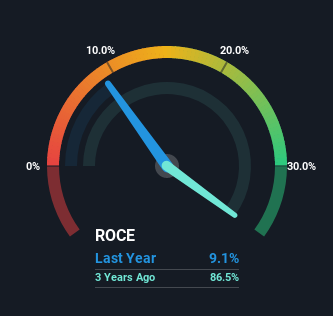Cheshi Technology (HKG:1490) Might Be Having Difficulty Using Its Capital Effectively
Finding a business that has the potential to grow substantially is not easy, but it is possible if we look at a few key financial metrics. In a perfect world, we'd like to see a company investing more capital into its business and ideally the returns earned from that capital are also increasing. Basically this means that a company has profitable initiatives that it can continue to reinvest in, which is a trait of a compounding machine. In light of that, when we looked at Cheshi Technology (HKG:1490) and its ROCE trend, we weren't exactly thrilled.
Understanding Return On Capital Employed (ROCE)
If you haven't worked with ROCE before, it measures the 'return' (pre-tax profit) a company generates from capital employed in its business. Analysts use this formula to calculate it for Cheshi Technology:
Return on Capital Employed = Earnings Before Interest and Tax (EBIT) ÷ (Total Assets - Current Liabilities)
0.091 = CN¥45m ÷ (CN¥560m - CN¥63m) (Based on the trailing twelve months to December 2021).
Therefore, Cheshi Technology has an ROCE of 9.1%. In absolute terms, that's a low return but it's around the Media industry average of 7.6%.
View our latest analysis for Cheshi Technology

Historical performance is a great place to start when researching a stock so above you can see the gauge for Cheshi Technology's ROCE against it's prior returns. If you're interested in investigating Cheshi Technology's past further, check out this free graph of past earnings, revenue and cash flow.
What The Trend Of ROCE Can Tell Us
On the surface, the trend of ROCE at Cheshi Technology doesn't inspire confidence. Over the last four years, returns on capital have decreased to 9.1% from 48% four years ago. On the other hand, the company has been employing more capital without a corresponding improvement in sales in the last year, which could suggest these investments are longer term plays. It's worth keeping an eye on the company's earnings from here on to see if these investments do end up contributing to the bottom line.
On a related note, Cheshi Technology has decreased its current liabilities to 11% of total assets. So we could link some of this to the decrease in ROCE. Effectively this means their suppliers or short-term creditors are funding less of the business, which reduces some elements of risk. Since the business is basically funding more of its operations with it's own money, you could argue this has made the business less efficient at generating ROCE.
The Bottom Line On Cheshi Technology's ROCE
In summary, Cheshi Technology is reinvesting funds back into the business for growth but unfortunately it looks like sales haven't increased much just yet. Since the stock has declined 55% over the last year, investors may not be too optimistic on this trend improving either. All in all, the inherent trends aren't typical of multi-baggers, so if that's what you're after, we think you might have more luck elsewhere.
Cheshi Technology does have some risks though, and we've spotted 4 warning signs for Cheshi Technology that you might be interested in.
While Cheshi Technology may not currently earn the highest returns, we've compiled a list of companies that currently earn more than 25% return on equity. Check out this free list here.
New: Manage All Your Stock Portfolios in One Place
We've created the ultimate portfolio companion for stock investors, and it's free.
• Connect an unlimited number of Portfolios and see your total in one currency
• Be alerted to new Warning Signs or Risks via email or mobile
• Track the Fair Value of your stocks
Have feedback on this article? Concerned about the content? Get in touch with us directly. Alternatively, email editorial-team (at) simplywallst.com.
This article by Simply Wall St is general in nature. We provide commentary based on historical data and analyst forecasts only using an unbiased methodology and our articles are not intended to be financial advice. It does not constitute a recommendation to buy or sell any stock, and does not take account of your objectives, or your financial situation. We aim to bring you long-term focused analysis driven by fundamental data. Note that our analysis may not factor in the latest price-sensitive company announcements or qualitative material. Simply Wall St has no position in any stocks mentioned.
About SEHK:1490
AI X Tech
An investment holding company, operates online automobile vertical media platforms that offers automobile content and marketing solutions through its PC websites, mobile websites, mobile applications, and business partner platforms in the People’s Republic of China.
Excellent balance sheet with very low risk.
Market Insights
Community Narratives




